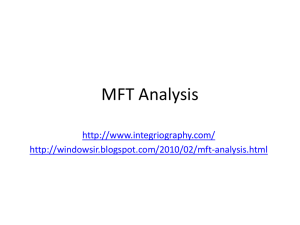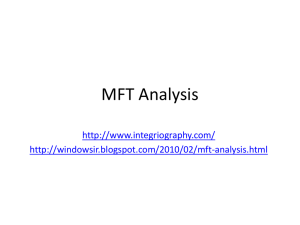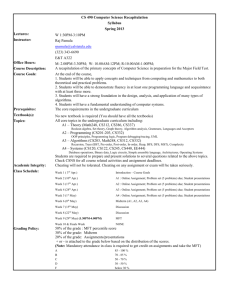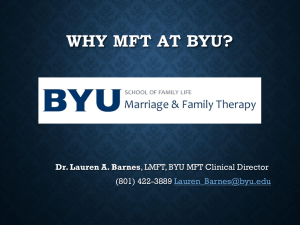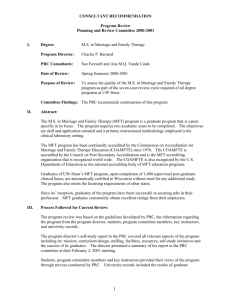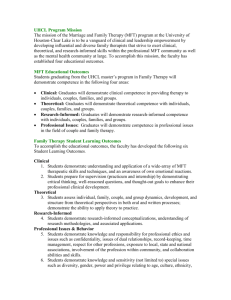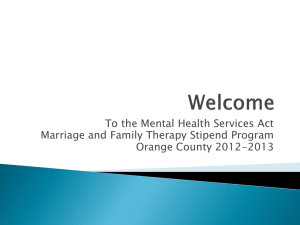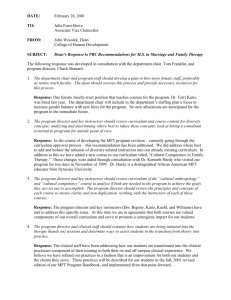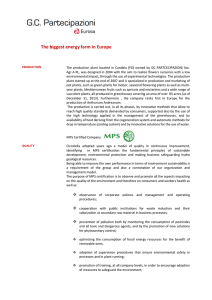MFT/MPS Negotiations MFT Topics, Themes, and Issues June 18
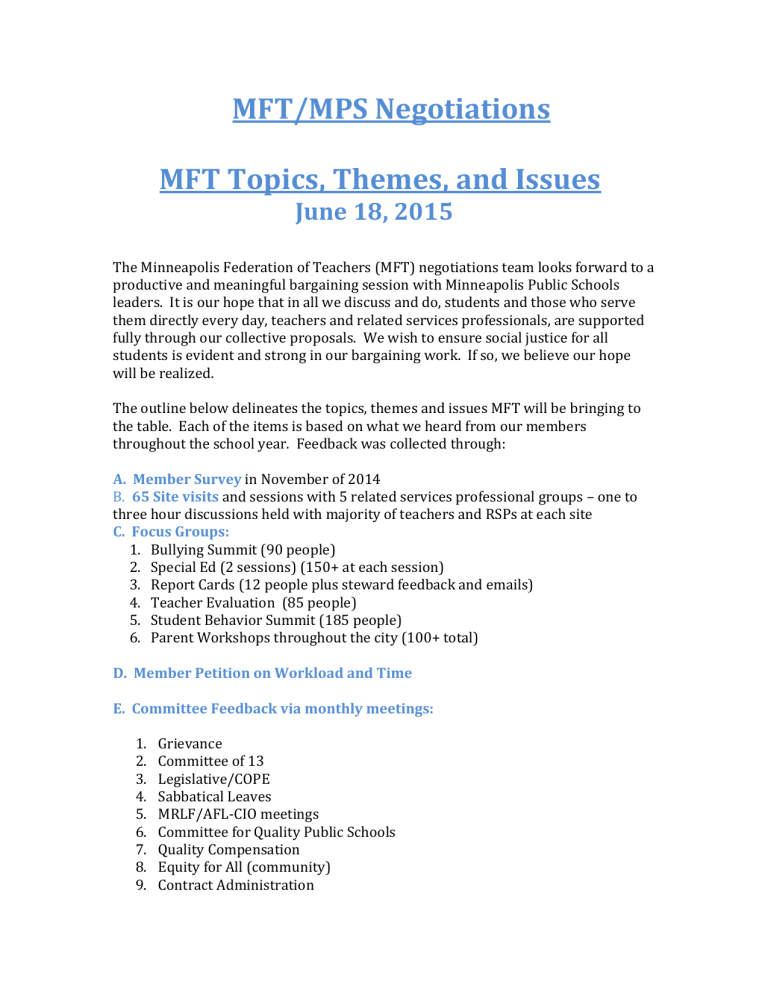
MFT/MPS Negotiations
MFT Topics, Themes, and Issues
June 18, 2015
The Minneapolis Federation of Teachers (MFT) negotiations team looks forward to a productive and meaningful bargaining session with Minneapolis Public Schools leaders. It is our hope that in all we discuss and do, students and those who serve them directly every day, teachers and related services professionals, are supported fully through our collective proposals. We wish to ensure social justice for all students is evident and strong in our bargaining work. If so, we believe our hope will be realized.
The outline below delineates the topics, themes and issues MFT will be bringing to the table. Each of the items is based on what we heard from our members throughout the school year. Feedback was collected through:
A. Member Survey in November of 2014
B.
65 Site visits and sessions with 5 related services professional groups – one to three hour discussions held with majority of teachers and RSPs at each site
C. Focus Groups:
1. Bullying Summit (90 people)
2. Special Ed (2 sessions) (150+ at each session)
3. Report Cards (12 people plus steward feedback and emails)
4. Teacher Evaluation (85 people)
5. Student Behavior Summit (185 people)
6. Parent Workshops throughout the city (100+ total)
D. Member Petition on Workload and Time
E. Committee Feedback via monthly meetings:
1.
Grievance
2.
Committee of 13
3.
Legislative/COPE
4.
Sabbatical Leaves
5.
MRLF/AFL-CIO meetings
6.
Committee for Quality Public Schools
7.
Quality Compensation
8.
Equity for All (community)
9.
Contract Administration
10.
Special Ed Labor Management
11.
MFT Budget
12.
MFT Officers Joint Committee
13.
MFT Joint Executive Board
F. Stewards’ Meeting Topics
1.
Report Cards
2.
Focused Instruction (Lynch)
3.
Teacher Evaluation (Glass)
4.
Quality Compensation (Olson and Hegre)
5.
PDPLC (Ruhs)
6.
Acceleration 2020 (Zoe)
7.
Office of Black Male Achievement (Walker)
8.
Organizing members at sites (stewards)
9.
Student Based Budgeting (Doty)
10.
21/26 pay option change (Beismeier)
11.
Negotiations (steward feedback)
12.
Davis Center Redesign (Goar)
13.
ILT – what makes a good team and process?
14.
Student Behavior (Francis and Johnson)
15.
District Calendar (Matier)
16.
Member Mobilization
17.
Equity for All (William Barber weekend)
18.
On the Radar – Stewards
19. Legislative
G. Other feedback avenues:
Official member meetings, “On the Radar” discussions about site issues, emails and phone calls from members, one to ones, new teacher meetings, member gettogethers, parent meetings and lunches, parent phone calls and discussions.
H. Conferences and Conventions:
American Federation of Teachers
National Education Association
Education MN
Teacher Union Reform Network (TURN)
MFT Proposed Topics and Themes
Main Topics
The topics listed below are issues teachers and related services professionals have said are the most important to them. We will propose solutions to improve each and believe our students will benefit the most from the changes we seek.
1. Workload/Time
Preparing for the next day’s work with students is one of the most critical responsibilities we have as professionals so we are prepared high quality, differentiated lessons; appropriate resources; specialized strategies and student interactions. This requires reflection, research and planning. MFT has been on a mission to bring the workload under control so teachers and RSPs can be at their best for students. Students deserve a well-prepared professional each day.
MFT will look for changes in number of programs and initiatives, time structures for planning, professional learning and collaborating, and an increase in professional voice/professional autonomy.
2. Small Class Sizes and Caseloads
The quintessential research of Biddle and Berliner state teachers can close the academic gap and raise the learning bar if students get the attention they need via small class sizes. The cost benefit of smaller class sizes over time are immense – successful students equals successful adults who contribute to society.
MFT seeks to continue to find creative ideas to ensure students are getting the attention they need and deserve from teachers and RSPs. This will mean finding ways to lower the student-teacher ratio.
3. Student Behavior
Emotions can facilitate or impede a student’s academic engagement, work ethic, commitment to school, and overall student success. Relationships and emotional processing affect how we learn. Districts, schools and families must effectively address these aspects of social emotional learning that will benefit all MPS students.
MFT seeks to find solutions to student behavior issues and to supporting the needs of all of our students particularly in the areas of social emotional
support and mental health needs. We want to revisit the new behavior plan and its implementation as well as how to partner with others to get more engaged support for our students. We will be looking for ways to increase staffing of those who can help students with any of the special social emotional needs they may have.
4. Student Needs
It is essential that the whole child is supported both in and out of school to ensure healthy development. Whether emotional, physical, social, creative, or cognitive, meeting our students’ needs can no longer be ignored if we wish to ensure academic and social success of our children and youth.
MFT seeks to find strategies that will serve the whole child. Whether wrap around services done in partnership with others or changing the way in which we “do” school, we must bring this into focus now. It is time.
MFT seeks to find solutions and strategies for a wide variety of issues surrounding specific student needs (e.g. – ELL students – the increase in the number of EL students without commensurate supports).
Increased support for the social emotional/mental health needs of MPS students as well as the development of social skills that may align with the
Student Behavior proposal
Physical needs of student (glasses, medication, proper clothing, housing, nutrition, etc.) are critical if a student is to be ready to learn. We seek to find partnerships that will assist the district/schools in ensuring our students have the basics in life so they can be successful in school and in life.
5. District/Site Culture and Climate
Trust is perhaps the most important element of a harmonious, synergistic and efficient work environment. Organizations that have trust among employees are usually successful; those that don’t usually are not. (David Bowan)
MFT seeks to develop a deeply respectful and supportive environment free of bullying throughout MPS schools and offices. It is critical to student and adult success that each person is treated with dignity.
MFT members seek a stronger, more collaborative partnership with MPS leadership in the decisions that get made around teaching and learning, how buildings are run, and how distributive leadership can happen in each site.
6. Professionally Powered Schools, Community Partnership Schools,
Autonomous Schools
Public education needs to be transformed in order to fulfill the responsibility of educating students to their fullest potential. This will require innovation from the ground up that involves teachers, RSPs, school staff, parents and families, community and all others who impact and influence our city.
In professionally powered schools, teachers and RSPs share and accept the full responsibility for the success of their school while working in partnership with all those involved in the future of our children and youth. Those involved feel an increased sense of ownership and have a greater ability to make changes they deem critical to improving student success as well as the teaching profession.
MFT seeks to empower sites to have more autonomy from District rules and procedures in order to create the best teaching and learning environment possible. We would like to improve the CPS model, allow for professionally powered schools (that may not be CPS) and be free to carry out the mission and vision of a school without heavy, top down interference. (For example,
IB, Montessori, and magnet schools). There must also be a safe space for innovating teaching and learning without constant pressure to conform to a one size fits all. We will expect accountability in these innovations.
7. Teacher Evaluation, SOEI, PDPLC, A of T, PAR
The purpose of each of these processes should (and originally was) be to aid the continuing development of MPS professionals; to build, maintain and retain a highly skilled workforce. Since the use of SOEI as an observation tool, we have simply been measuring rather than developing teachers. We have turned development into a busy, unreliable, and punitive hoop jump.
MFT seeks to examine and change the current teacher evaluation process, review the feedback about what’s working and what’s not, and develop a more comprehensive and supportive system of growth that also meets the teacher evaluation expectations of MDE. We want to create this change in full collaboration with those who are most effected by the evaluation – the teachers and RSPs to ensure it will be useful and productive.
8. Special Education
Special education addresses the individual needs by providing appropriate and differentiated support. The purpose is to ensure an equitable education that leads a student with special needs to a higher level of personal self-sufficiency.
MFT seeks to ensure the Inclusion model is the right path to take going forward. Should that be the case, MFT would like to see that the plan for the inclusion model is properly spelled out, is appropriate to the needs of MPS special education students, and that staff is fully prepared for the change.
This will include quality training and demonstration of implementation so teach professional will be ready to implement the new model successfully.
We would like to ensure that each special ed student involved in any change will benefit from this new model.
MFT would like parents to be a stronger part of the decision making process around what is happening to their child. At the very least, we need a much improved communication process for both parents and teachers.
Other SPED issues: appropriate sized caseloads, paperwork, needed staffing, time with students, weighted student funding, SEA allocations, treatment of staff, protections needed for students and staff as we move to more autonomy of schools to ensure student needs are being met.
9. Focused Instruction, Content Specific Curriculum, Culturally Relevant
Curriculum, Student Testing.
Teaching and learning must be built on rich and deep curriculum. Student assessments/testing needs to be appropriate, aligned, and meaningful.
MFT seeks to ensure MPS uses high quality curriculum that is culturally relevant, appropriate to the developmental needs of the learners, integrated with other content areas and aligned to the assessments. We believe this will create a more engaging and useful education for every student.
Professional Pay courses – expanded and aligned to the needs of our students and staff. For example, inclusion of Culturally relevant courses that assist teachers and RSPs in being culturally aware and proficient.
Other Themes and Issues:
The topics listed below do not have a theme but are items we wish to address – either to change, improve, or increase efforts around them.
A. Elementary report cards; revise the report card, number of times sent.
B. Interview and Select – addressing issues; reviving LM committee
C. Cleaning up of past memorandum of agreements (MOAs); reviewing implementation of past MOAs and how to improve them.
D. Increasing the number of Teachers of Color via our Grow Your Own processes; improved recruitment and support.
E. Pay and Benefits:
Incentives for: attracting and retaining professionals; supporting good attendance; improving “attractiveness” of working in MPS; improved benefits/healthcare costs especially for families, etc. We will also be seeking a cost of living increase to ensure our teachers and related services professionals can be fully supported on their salaries.
F. Use of Opening Week for preparing for students. Work time in classrooms, offices and with colleagues so we will be fully prepared for students at the start of school.
G. Overall implementation of MPS programs and initiatives – how to improve.
H. Communication with MPS staff – how to improve.
I. Grievable vs. non-grievable portions of the contract.
J. Early Education – more of it, increased staffing, appropriate ProPay and PD needed, better inclusion into the district overall.
K. Leadership effectiveness at sites – creating a process of support; how to ensure attention to sites that are dealing with difficulties in leadership with appropriate changes being made in a fair but timely way.
L. Health related issues at sites (Nurses to present.)
M. Library/Media issues (LM Specialists to present)
N. Increased parent engagement and involvement.
O. Fidelity to Labor Management agreements and implementation of said agreements.
MFT reserves the right to bring forward other issues that may pertain to one of more of the topics listed. This list is a an overall synopsis of what MFT would like to review and discuss in order to improve teaching, learning, leading, and student success.
